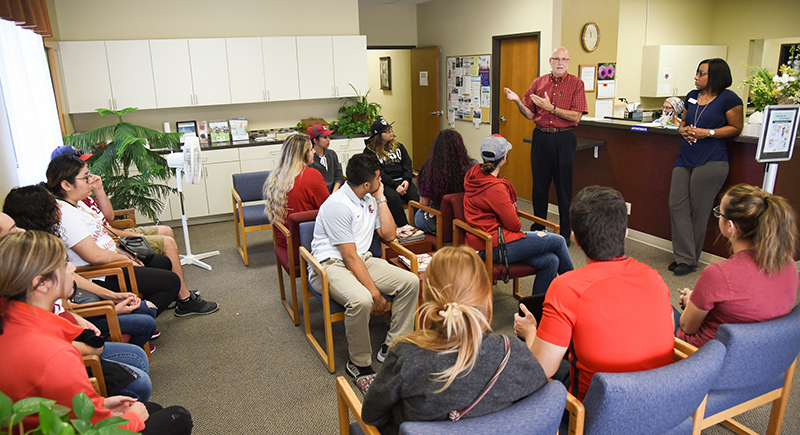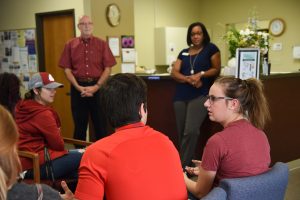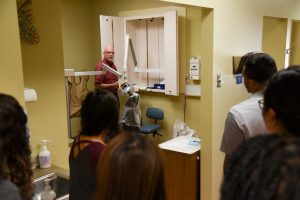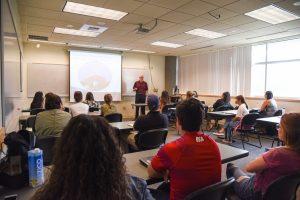
December 21, 2017 Psychology course partners with Grace Clinic to assess mental health of diabetes patients
By Maegan Murray, WSU Tri-Cities
RICHLAND, Wash. – An elementary statistics in psychology course at Washington State University Tri-Cities partnered with Grace Clinic, a free health clinic in the Tri-Cities, to assess the mental health of its diabetic patients. The clinic now plans to use the data to maintain and improve its methods in meeting patient resources and health needs.

WSU Tri-Cities students talk with Grace Clinic leadership about the resources they offer through the clinic.
Throughout the fall semester course, the students analyzed the clinic’s diabetic patient A1C score data, which indicates the degree to which patients have their diabetes under control, and used a range of statistical assessments to determine the mental health of patients based on several potential barriers to treatment – some of which include age, race, language spoken and gender. They presented their results this month to Mark Brault, Grace Clinic’s chief executive officer, and clinic director Avonte Jackson.
The experience proved beneficial to both the clinic and the students.
“I believe that the students gained a lot of insight from this project – into themselves, the field and their community,” said Janet Peters, clinical assistant professor of psychology and instructor of the course. “The project also gave them a very marketable skillset related to quantitative literacy, social responsibility and communication skills.”
For the Grace Clinic, the main benefit is that the data provides support for some of the patterns they had been informally observing and the leg work to accomplish the analysis of that data, Peters said.
“Larger health organizations have people to do this kind of thing,” Brault said. “We have limited resources for this kind of in-depth analysis. We plan to use this data as we move forward.”
Student findings
Through their analysis, the students found that the clinic was doing an excellent job of creating access to health care. They determined that there was no definitive statistical differences in the observed mental health of their patients based on potential barriers to treatment such as primary language spoken and race.

Grace Clinic CEO Mark Brault takes WSU Tri-Cities students on a tour of the clinic.
The students did find, however, that there was a slight negative correlation between age and mental health, meaning that older patients reported slightly lower levels of mental health than younger patients, overall.
During her presentation, student Lindsay Bernesky recommended that the clinic leaders dedicate additional time to educating patients about the mental health services offered.
Impact on Grace Clinic
Both Brault and Jackson said the student presentations were informative and confirmed many of the things that their staff had suspected, but hadn’t had the time to dive into and assess.
“It is nice to have some statistical analysis to confirm many of these things,” Jackson said.

Grace Clinic CEO Mark Brault presents to WSU Tri-Cities psychology students about the clinic and the services they offer.
She also said the clinic plans to follow up on the mental health gap for their elderly patients, and that it has already started to introduce some additional services for that population.
“One of the gaps we recently discovered is that there is limited access to mental health services for Medicare patients,” she told the students. “We recently added patients with Medicare to our mental health area,” which affirms some of the student findings.
Brault said the clinic also is adding additional safety nets and services to support patient mental health throughout their clinic. In addition to seeing a physician, a scheduled health visit might also include seeing a mental health professional.
“It was good to hear that a lot of what we’re doing is working, and that a lot of what we’re putting in place will serve the needs of our patients,” Brault said.
Real-world benefit to students
Many of the students said they enjoyed the real-world aspect of the course and that it provided a greater understanding of statistical analysis in psychology research.
“I can read through a case study and understand all of the terminology and be able to fully understand the results,” student Nagat Deng said.
“To know that we took a burden off of them and that we are giving back in that way is amazing,” student Caitlyn Carroll said.
Student Martha Herrera said she appreciated that the real-world experience was interwoven with regular course material, which allowed students to work as a team.
“Dr. Peters gave us this opportunity to do something that would be beneficial for the community,” she said. “I think it is awesome that we have that opportunity here at WSU.”





